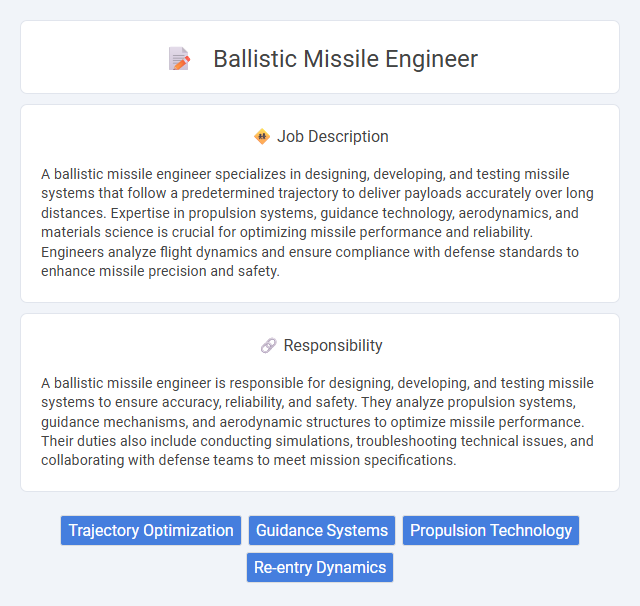
A ballistic missile engineer specializes in designing, developing, and testing missile systems that follow a predetermined trajectory to deliver payloads accurately over long distances. Expertise in propulsion systems, guidance technology, aerodynamics, and materials science is crucial for optimizing missile performance and reliability. Engineers analyze flight dynamics and ensure compliance with defense standards to enhance missile precision and safety.
Individuals with strong analytical skills, a high tolerance for stress, and an interest in advanced aerospace technology are likely to be well-suited for a ballistic missile engineer role. Those who excel in precision, problem-solving, and teamwork might find the demanding nature of the job manageable and rewarding. Conversely, people who struggle with high-pressure environments or intricate technical challenges may find this career less compatible with their strengths.
Qualification
A ballistic missile engineer requires a strong foundation in aerospace or mechanical engineering, typically holding at least a bachelor's degree in these fields or related disciplines such as nuclear engineering. Advanced knowledge of propulsion systems, guidance technologies, and materials science is essential, often supplemented by experience with computer-aided design (CAD) software and simulation tools. Security clearance and familiarity with defense industry standards ensure the engineer can work effectively on sensitive missile technology projects.
Responsibility
A ballistic missile engineer is responsible for designing, developing, and testing missile systems to ensure accuracy, reliability, and safety. They analyze propulsion systems, guidance mechanisms, and aerodynamic structures to optimize missile performance. Their duties also include conducting simulations, troubleshooting technical issues, and collaborating with defense teams to meet mission specifications.
Benefit
A ballistic missile engineer role probably offers substantial financial rewards due to the specialized technical expertise required. Benefits likely include access to cutting-edge technology and opportunities for career advancement within defense sectors. Employees may also enjoy comprehensive healthcare packages and job stability given the strategic importance of missile technology.
Challenge
A ballistic missile engineer likely faces complex challenges involving precise calculations and advanced materials to ensure missile accuracy and reliability. They probably deal with high-pressure scenarios requiring innovative problem-solving under strict safety and regulatory standards. The role may demand continuous adaptation to emerging technologies and evolving defense requirements.
Career Advancement
A ballistic missile engineer advances their career by gaining expertise in missile propulsion, guidance systems, and aerodynamics, often progressing to senior engineering or project management roles. Professional development through certifications in defense technologies, specialized software, and leadership training enhances opportunities for leadership positions in defense contractor firms or government agencies. Continued research and development contributions to missile system innovations position engineers as key assets, accelerating career growth in the defense industry.
Key Terms
Trajectory Optimization
A ballistic missile engineer specializing in trajectory optimization applies advanced mathematical models and simulation software to design precise flight paths that maximize missile range, accuracy, and efficiency. Expertise in aerodynamics, propulsion systems, and control algorithms is essential for calculating optimal trajectories under varying atmospheric and gravitational conditions. Proficiency in programming languages such as MATLAB and Python, combined with experience in computational fluid dynamics (CFD), enhances the ability to refine missile performance and ensure mission success.
Guidance Systems
A Ballistic Missile Engineer specializing in Guidance Systems designs and develops advanced navigation and control technologies to ensure accurate missile trajectory and target acquisition. They work extensively with inertial navigation systems, GPS integration, and control algorithms to optimize missile precision and reliability under various flight conditions. Expertise in sensor fusion, real-time processing, and fault-tolerant system design is critical to advancing missile guidance performance and mission success.
Propulsion Technology
A ballistic missile engineer specializing in propulsion technology designs and tests advanced rocket engines to optimize thrust, fuel efficiency, and trajectory precision. Expertise in liquid and solid propellant systems, thermodynamics, and materials science is essential to enhance missile range and reliability. Responsibilities include developing propulsion components, conducting performance simulations, and ensuring compliance with safety and defense regulations.
Re-entry Dynamics
Expertise in re-entry dynamics is critical for a ballistic missile engineer, focusing on the behavior of warheads as they re-enter the Earth's atmosphere at hypersonic speeds. This specialization involves analyzing aerothermal heating, shockwave formation, and trajectory stability to ensure accurate target engagement and vehicle survivability. Proficiency in computational fluid dynamics (CFD) and high-temperature material science enhances the design and optimization of re-entry vehicles under extreme conditions.
 kuljobs.com
kuljobs.com